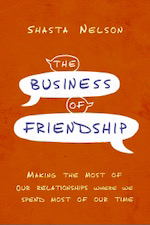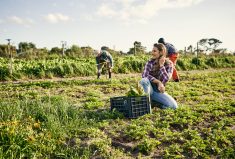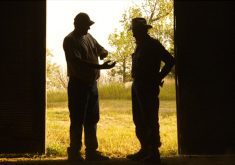Do you find yourself craving connection? Wishing you had more friends? Or that you could spend more time with the friends you do have? Do you long to be able to share more of your worries and concerns with your friends?
If you answered yes to any of these questions, you are in the majority. Even before the pandemic, public health officials around the world had identified loneliness as a serious problem. For the past 40 years, people have increasingly reported feeling lonely. And now, more than a year into a global pandemic, many of us are feeling even more isolated.
This is bad news. Loneliness has been proven to not only contribute to health issues and unhappiness, but it also has an impact on workplace productivity, employee retention, innovation, and profitability, says San Francisco, California friendship expert Shasta Nelson.
Read Also

Ground rules for farm family communications
Establishing meeting ground rules can help your family find ways to communicate that work for your farm. Here are some…
The quality of your relationships is the most important factor for happiness in your life, says Nelson. “How loved and supported you feel tells us more about your mental and physical health than what you’re eating and whether you’re exercising.” Loneliness is also often correlated with depression and anxiety.
In her previous career as a minister, Nelson witnessed the depth of pain caused by loneliness and the stigma around admitting that we are lonely. She changed career paths to direct all of her efforts to ending that stigma and to help people increase their sense of belonging.
Similar to hunger, which is your body’s way of telling you that you need to eat, Nelson says loneliness is your body’s way of signaling that you are hungry for connection. “There should be no shame in that.”
Nelson has seen a shift since she first began focusing on friendship in her work a dozen years ago. At first, people weren’t even aware that what they were feeling was a need for more connection. Now we are getting better at identifying when we are in need of more support.
The pandemic has also made it more socially acceptable to talk about our need for connection.
Unfortunately, there are still many misconceptions around the issue of loneliness. Some of us visualize lonely people as those with poor social skills or who live alone, but even people who are very busy socially can be lonely, says Nelson. It’s the quality of those connections that matters. She says that although our social networks are bigger than ever, the quality of those relationships leaves many of us feeling “unseen” and “unheard.”
Nelson’s deep dive into the scientific literature indicates that healthy relationships have three components in common: positivity, consistency and vulnerability.
Positivity refers to fun, laughter, gratitude, enjoyment, appreciation, empathy and validation. (Research has shown that there needs to be at least five positive emotions for every negative one for a relationship to feel satisfying.)
Consistency is putting in the time, logging the hours, to build a history that has us feeling we can rely on each other. This is why it’s easier to make friends at school or in the workplace where you see people every day.
Vulnerability is that feeling that our friends “get us,” that they “see us.” They are witnesses to our lives and share our stories, opinions and ideas.
If a relationship is not feeling meaningful, Nelson says it’s because one of these three requirements is missing.
Due to social conditioning, which discourages men from being vulnerable with one another, it’s not uncommon for men to feel their relationships lack closeness, says Nelson. One study showed that when boys entered adolescence, the nature of their male friendships changes. They start to feel they can’t be vulnerable with their friends. On the other hand, girls are encouraged, even pressured, to have close friendships.
This is a societal problem, asserts Nelson. “Collectively, we need to do better. Friendship is a human need. It is not something that women are automatically better at even though they may be more practised at it.”
The societal pressure around men’s friendships also might explain why men have a tendency to remarry quickly after a divorce or the death of a spouse, says Nelson. “In many cases, they only experience intimacy or closeness with romantic partners.”
It can feel awkward for men at first if they aren’t used to showing vulnerability but, like strengthening a muscle, Nelson says it can get easier with practice. “It’s like incrementally training for a race… share a little bit more each time as the relationship increases in consistency.”

Nelson lays out some options if you are feeling you want more meaningful friendships in your life. It’s easier to reconnect with old friends than to make new friends. “Rekindling relationships moves you faster into vulnerability because you already have some consistent history,” she says.
While pandemic restrictions have meant we don’t interact socially with people in the usual ways, some people have found ways to use digital tools like video chatting to maintain or increase the consistency of their relationships. Nelson shares a personal example: weekly Zoom dates with a group of friends scattered across the U.S. have allowed her to feel closer to friends that she usually only sees once a year.
Being intentional about increasing vulnerability in conversations can help to make both parties feel seen and heard. Ask “what’s feeling good right now? What’s feeling stressful?” These open-ended questions open the door for both people to talk about the things that are on their minds and avoid getting stuck in small talk.
Finally, Nelson says listening is an important part of any relationship. Say something like “That does sound hard… Thank you for sharing. What can I do to help?” to let the other person know that they’ve been heard. Avoid responding with “toxic positivity,” warns Nelson. “We don’t want to be fixed or cheered up. We want to feel understood and accepted, not judged.”
Self-check-in
Friendship expert Shasta Nelson says that many people have trouble identifying when they are hungry for more connection. She recommends a self-check-in. On a scale of one to 10 (with 10 being most fulfilled/satisfied), ask yourself how satisfied you are with your current relationships? How supported do you feel? Don’t be surprised if you score below five out of 10, most of us do.
Identifying this hunger for more contact is the first step towards increasing social connection. The old adage “you have to name it to tame it” is true in this case. Be proud of naming it, now ask yourself what would help to bring that number up? Do you need more friends? Do you need to spend more time with your friends? Or do you want to feel closer to the friends you already have? Says Nelson: “Most of us have some wisdom here, our own personal awareness of what we’re hungry for.”
Tips for more fulfilling friendships
(From friendship expert Shasta Nelson)
To increase consistency:
- Do something memorable together. Go to a comedy club, attend a retreat, try something new.
- Send a text or leave a voice mail.
- Schedule a routine of get-togethers or phone calls.
To increase positivity:
- Express gratitude generously.
- Validate each other’s feelings.
- Do something unexpected to bring delight or joy.
To increase vulnerability:
- Be curious, show interest. Ask follow-up questions. What was that like? How did that feel?
- Practise talking about the things you’re proud of or insecure about.
Resources
- Shasta Nelson: The Business of Friendship: Making the Most of Our Relationships Where We Spend Most of Our Time and Frientimacy: How to Deepen Friendships for Lifelong Health and Happiness. (books)
- Together: The Healing Power of Human Connection in a Sometimes Lonely World, a 2017 book by U.S. Surgeon General Vivek Murthy.
- TEDx Talk with Shasta Nelson: Frientimacy: The three requirements of all healthy relationships
















